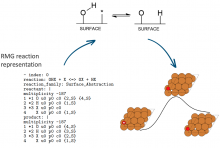pynta

pynta is designed to automatically characterize chemical reactions relevant to heterogeneous catalysis. In particular, it spawns and processes a large number of ab initio quantum chemistry calculations to study the reactions of gas-phase species on crystal facets. It is designed to run on petascale and upcoming exascale machines. The code systematically places adsorbates on crystal facets, by enumerating the various unique crystal sites and considering the symmetry of the adsorbates and the surface. The structures are systematically perturbed to investigate all possible adsorption geometries. Following this, the code performs modifications to these structures and searches for saddle points on the potential energy landscape in order to characterize the reactions these adsorbates can undergo. After a series of such calculations the code arrives at well-characterized reaction pathways, which can be in turn used to calculate rate coefficients and can be implemented in microkinetic mechanisms.
